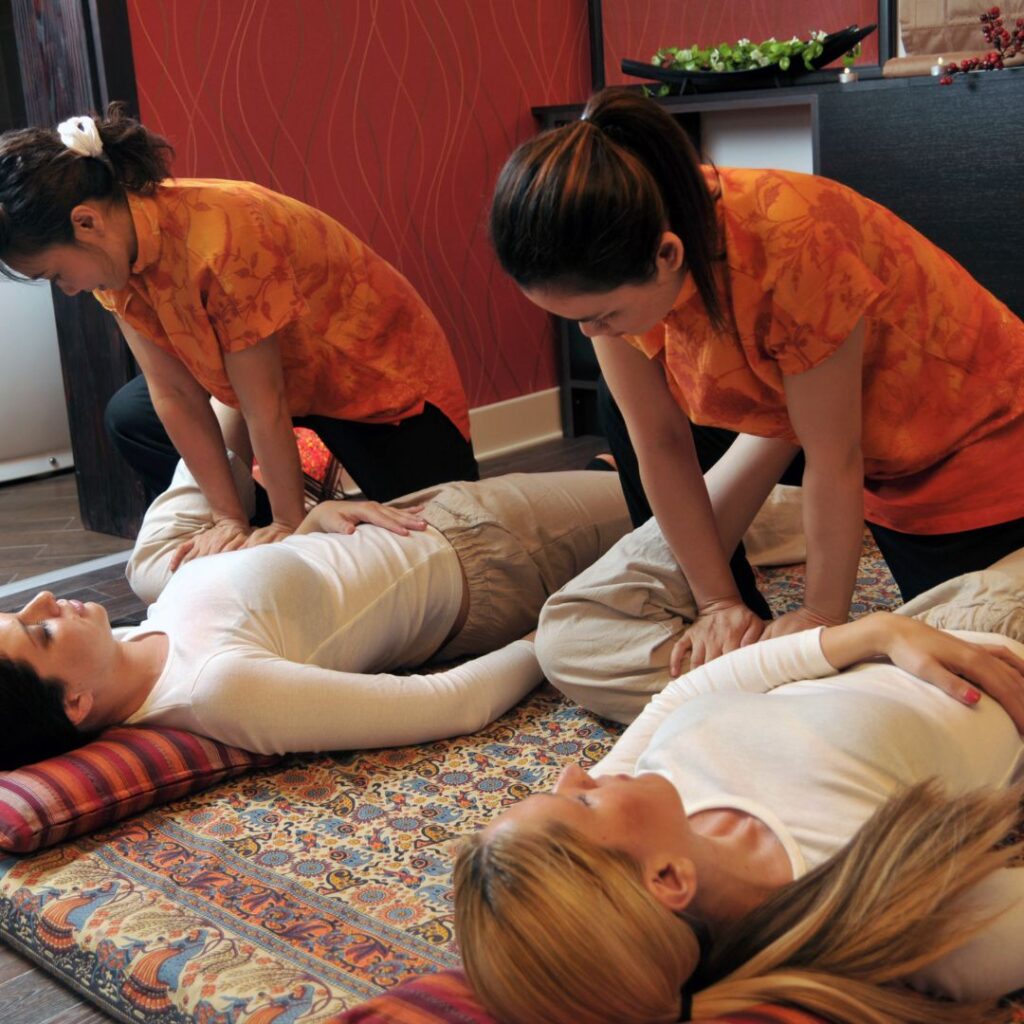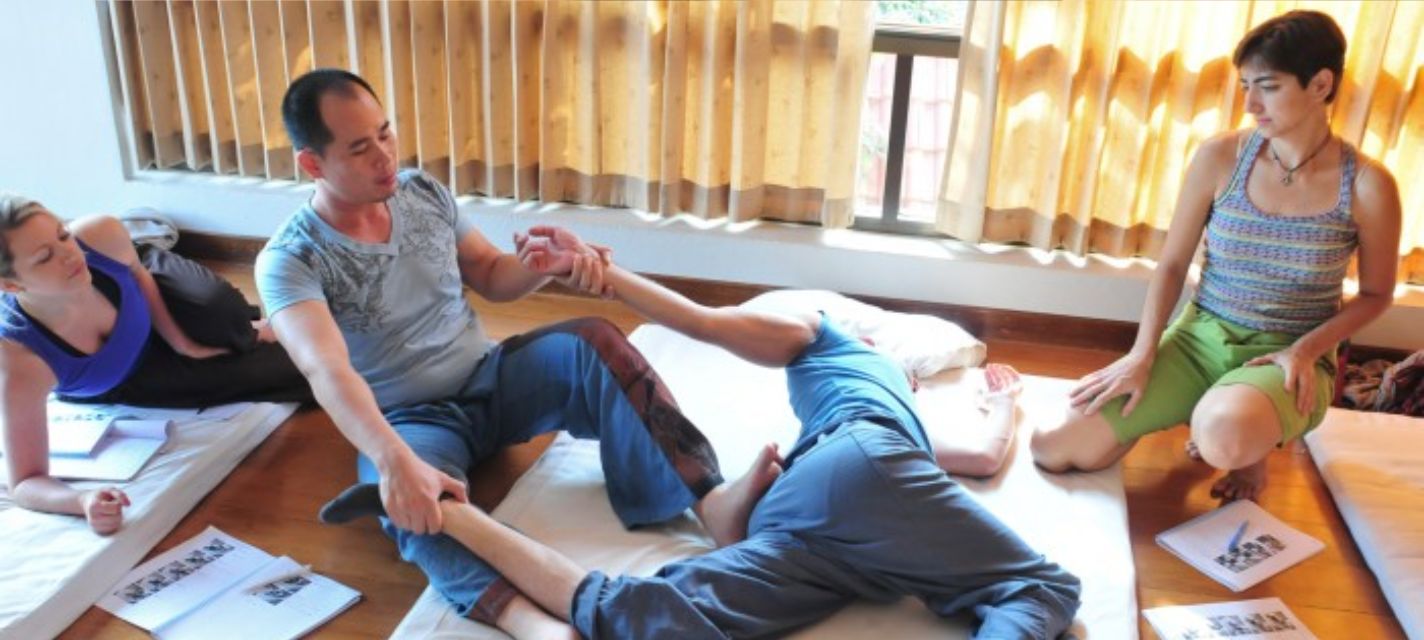Thai massage training offers a unique blend of benefits that enhance both personal wellness and professional skills. Here’s a breakdown of how it can contribute to your well-being and career development:
Personal Wellness Benefits
- Increased Flexibility and Mobility
- Thai massage incorporates stretching techniques that help improve flexibility. As you practice these techniques on others, you naturally enhance your own range of motion and flexibility.
- Stress Relief and Relaxation
- The rhythm and flow of Thai massage induce a deep sense of relaxation. By learning the art of Thai massage, you can apply these techniques to manage your own stress levels and encourage a calm, centered mindset in your daily life.
- Enhanced Circulation
- Thai massage involves acupressure points and stretching that stimulate blood flow throughout the body. This can lead to improved circulation, reducing the risk of muscle tension, cramps, and other circulatory issues.
- Mind-Body Connection
- Thai massage is often described as a moving meditation. The focus on breathwork, alignment, and the slow, deliberate flow of movements can deepen your connection to your body and enhance your mindfulness practice.
- Improved Posture
- Learning Thai massage encourages awareness of body posture and alignment. This not only benefits your technique when working on clients but also improves your own posture, reducing the risk of back pain or other musculoskeletal issues.
- Energy Balance
- Thai massage is based on the concept of energy lines (Sen lines) in the body. By learning to work with these lines, you may gain insight into how energy flows through your body, leading to greater overall vitality and wellness.

Professional Skills Enhancement
- Versatile Skillset
- Thai massage training equips you with a broad skillset that includes techniques such as assisted stretches, acupressure, and deep tissue work. This variety allows you to cater to a wide range of client needs, making you a more versatile practitioner.
- Holistic Healing Approach
- Thai massage integrates physical, mental, and spiritual healing. By learning this holistic approach, you can offer clients not just physical relief, but a sense of balance and emotional well-being as well.
- Client-Centered Care
- Thai massage training emphasizes understanding the needs of each individual client. This fosters strong communication skills, as you learn to listen to client feedback and adjust your technique accordingly to ensure the most effective treatment.
- Cultural and Historical Knowledge
- Thai massage has a rich cultural and historical context that deepens your understanding of traditional healing practices. This knowledge can be valuable for creating a deeper connection with clients and offering a unique service that combines ancient wisdom with modern wellness.
- Business Opportunities
- As a certified Thai massage practitioner, you open the door to various professional opportunities. These could include working in spas, wellness centers, or opening your own practice. The skills you gain also make you eligible to teach Thai massage to others, adding another revenue stream.
- Building Client Relationships
- The personal and hands-on nature of Thai massage allows for deeper connections with clients. As a practitioner, you’ll develop the interpersonal skills to build trust and rapport with clients, which is essential for retaining a loyal customer base.

Mental and Emotional Benefits
- Increased Focus and Discipline
- Thai massage requires both physical strength and mental discipline. Learning the intricate techniques and sequences helps sharpen focus and fosters a deeper level of concentration, which is beneficial both professionally and personally.
- Empathy and Emotional Intelligence
- Working closely with clients allows you to develop empathy and a deeper understanding of people’s needs. Thai massage training encourages practitioners to approach clients holistically, considering emotional and psychological states along with physical issues.
- Confidence and Self-Esteem
- Gaining expertise in a respected and traditional healing modality like Thai massage boosts confidence. It can provide a sense of accomplishment and purpose, especially as you see the positive impact your work has on clients.
- Mindfulness and Self-Care
- The practice of Thai massage is often linked to mindfulness techniques, such as being present in the moment and focusing on the breath. This can encourage you to prioritize self-care and incorporate mindfulness into your daily life, improving both mental and physical well-being.
Conclusion
Thai massage training not only helps you develop valuable professional skills that enhance your career, but it also promotes personal growth and well-being. By incorporating elements of flexibility, stress relief, mindfulness, and energy balance into your life, you can improve your overall health. Simultaneously, by mastering a holistic and versatile healing practice, you expand your professional toolkit, enabling you to offer a unique and valuable service to clients.
In sum, Thai massage is not just a career skill—it’s a path to a more balanced, healthy, and fulfilled life.

